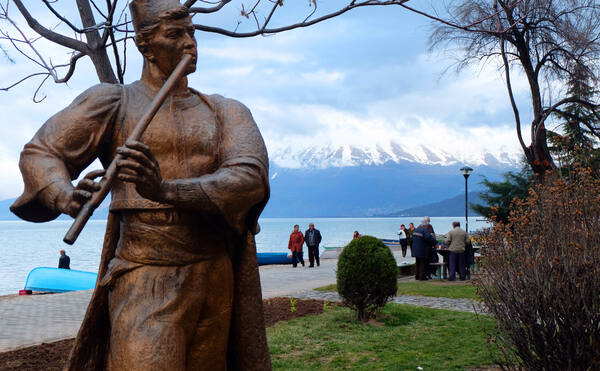Natural and cultural heritage of the Ohrid region

Objectives
The general term “Upstream process” covers all the actions undertaken to improve the processes and practices related to the preparation of a nomination to the World Heritage List. The objective was to explore creative approaches and new forms of guidance that might be provided to States Parties when considering nomination projects prior to the submission of a dossier, in order to assess their feasibility, as well as in relation to the nomination process itself. It did not imply that a site going through the “upstream process” would ultimately be inscribed on the World Heritage List, but it would reduce the number of properties experiencing significant problems during the nomination process.
Launched in 2011, the “upstream process” started, on an experimental basis, with ten pilot projects (one per UNESCO electoral group). The “Natural and Cultural Heritage of the Ohrid Region” was one of the ten pilot projects, selected upon proposal by the UNESCO Eastern Europe group.
The Natural and Cultural Heritage of the Ohrid region was inscribed on the World Heritage List for its natural values in 1979 and for its cultural values a year later. The integrity of the property now located in the former Yugoslav Republic of Macedonia could be strengthened by extending it to the remaining one-third of Lake Ohrid located in Albania. As a preliminary step, the Natural and Cultural Heritage of the Ohrid Region was added to Albania’s Tentative List in 2011.
This project aimed to:
- assess the feasibility and appropriateness of an extension of the Natural and Cultural Heritage of the Ohrid region, including but not limited to the extension into Albania and to clarify the differences between the natural and cultural heritage perspective;
- develop a roadmap for a potential transboundary extension of the Natural and Cultural Heritage of the Ohrid region, under the same criteria.
Results
An ICOMOS/IUCN/WHC scoping mission took place in April 2012. It included a two-day workshop near Pogradec (Albania) to consult the main stakeholders of the Lake Ohrid area on the feasibility of the World Heritage extension project. The workshop was attended by numerous participants from Albania representing various stakeholder groups, as well as by representatives from the former Yugoslav Republic of Macedonia.
On the cultural side, much work is needed to improve the current knowledge of the cultural heritage of this area. Re-organization of available bibliographical and archival information as well as further research may contribute to shed further light on the historical-cultural development of the whole Lake Ohrid region, on the role played within this geo-cultural basin along the centuries by the today Albanian side of the lake and eventually to better understand its specific cultural significance.
As for its natural aspects, in light of integrity and effective management, there are numerous arguments for comprising the entire lake within one transboundary property. However, the question of lake management, in particular in view of shared management objectives and practices, remains open and requires further strengthening.
As a follow-up, a three-year project funded by the European Union for an overall amount of 1.7 million Euros (with a 10 % co-financing by the Government of Albania) was launched in 2014, implemented by UNESCO. Its specific objective is to establish an integrated management framework for the shared natural and cultural heritage of the transboundary Lake Ohrid region, in order to face the current threats to the site and develop the region in a sustainable manner.
This request was financed thanks to a contribution from the Government of Italy.